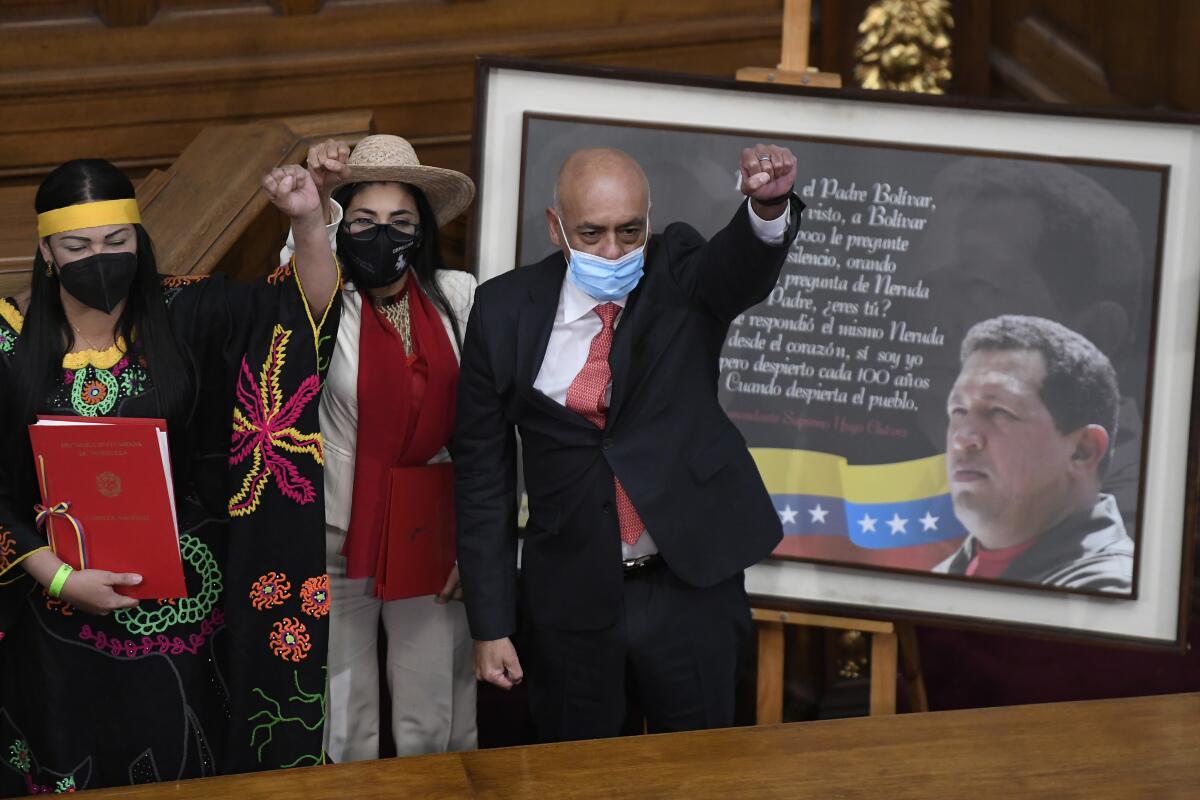Venezuela’s socialists take control of once-defiant Assembly

- Share via
CARACAS, Venezuela — Parading giant portraits of Hugo Chavez and independence hero Simon Bolivar, allies of President Nicolás Maduro retook control of Venezuela’s National Assembly on Tuesday, the last institution in the country he didn’t already control.
The symbolic restoring of the images to Venezuela’s legislature capped a celebratory day for the ruling socialist party in which it claimed to have avenged the humiliating defeat five years ago when government opponents won control of the legislature and proceeded to remove portraits of the two national icons in a fierce — if futile — challenge to Maduro’s lock on power.
Jorge Rodriguez, the new assembly president, vowed to “exorcise” from the legislative palace all vestiges of its previous occupants, whom he accused of plotting from its neoclassical chamber Maduro’s violent overthrow with the help of foreign mercenaries and the Trump administration.
“Just so there are no doubts, pretty soon we’ll spray every corner of the parliamentary chambers with holy water,” joked Rodriguez, who previously led internationally sponsored talks with the opposition as well as meeting with envoys from the Trump administration.
Maduro’s allies swept legislative elections last month boycotted by the opposition and denounced as a sham by the United States, the European Union and several other foreign governments. While the vote was marred by anemically low turnout, it nonetheless seemed to relegate into irrelevance the U.S.-backed opposition led by lawmaker Juan Guaidó.
Exactly a year ago, Guaidó, in a blue suit and tie, tried to scale a spiked iron fence to get past riot police blocking him from attending the assembly’s inaugural session, which according to the constitution must be held every year on Jan. 5.
In a far cry from that electric display of defiance, Guaidó held his own virtual legislative session Tuesday, via Zoom, with a cohort of opposition leaders.
“They are trying to annihilate Venezuela’s democratic force,” Guaidó said in his online address, which was overshadowed by the government’s celebratory session in the legislature downtown. “But we aren’t going to give up.”
Last month, anti-Maduro lawmakers, several dozen of them in exile, also gathered online to vote to extend their mandate stemming from a landslide victory in 2015 for another 12 months, operating through an adjunct committee normally reserved for legislative recesses.
Supreme Court justices loyal to Maduro immediately struck down that measure as invalid. But that hasn’t stopped the Trump administration from doubling down in its support of Guaidó.
“We consider this group to be illegitimate and will not recognize it nor its pronouncements,” Secretary of State Michael R. Pompeo said Tuesday, referring to the pro-Maduro assembly. “President Guaidó and the National Assembly are the only democratic representatives of the Venezuelan people as recognized by the international community, and they should be freed from Maduro’s harassment, threats, persecution and other abuses.”
While Guaidó’s bravery hasn’t wavered, the opposition’s political fortunes have tanked as Venezuelans’ own hopes for change have collapsed. Recent opinion polls say support for Guaidó has fallen by more than half since he first rose to challenge Maduro two years ago.
Meanwhile, Maduro has managed to retain a solid grip on power and the military, the traditional arbiter of political disputes in Venezuela.
Gaby Arellano, a lawmaker exiled in Colombia, said many in the opposition underestimated Maduro, thinking he stood no chance in a doomsday economic environment marked by hyperinflation, miles-long lines for gasoline and pulverized wages worth just a few pennies per month.
But Maduro has managed to outmaneuver his foes through a mix of repression and co-optation exacerbated by the opposition’s missteps, Arellano said. She expects a new round of repression now that Maduro has seized the Assembly.
On Tuesday, Guaidó criticized photos on Twitter showing what he said were security forces surrounding his apartment building in Caracas, the capital. The Associated Press was unable to confirm the report.
Reflecting the lack of unity in the opposition, a few lawmakers still in Venezuela, including Guaidó’s former deputy as National Assembly vice president, signaled they would no longer lay claim to their seats.
“We’re at the start of what looks like a very dark, new phase,” Arellano said.
With Maduro easily boxing out the opposition, his biggest threat may come from within his own coalition.
To reward loyal allies and paper over tensions between hard-line ideologues and moderates within the pro-government forces, the makeup of the legislature was expanded by 100 seats. Maduro also leaned on high-profile candidates, including First Lady Cilia Flores and his son, in a failed attempt to boost turnout, which was just 30%.
That poor showing — the lowest turnout for the Chavista movement since it swept into power more than two decades ago — was highlighted in a speech from the leader of a small group of 20 anti-Maduro lawmakers who refused to adhere to the opposition boycott of the election and will provide a rare dissonant voice in what is otherwise expected to be a rubber-stamping assembly.
“With those numbers you occupy 90% of the seats but that doesn’t reflect the reality of Venezuela,” Jose Gregorio Correa said amid catcalls and insults from socialist lawmakers. “Thinking differently isn’t a crime. This Venezuela doesn’t belong to you or to us but to all Venezuelans.”
Rodriguez emphasized that urgent work would be needed to mitigate the fallout from U.S. sanctions, which have exacerbated Venezuela’s many homespun economic problems. He also reiterated a desire for dialogue with the opposition at the same time that Maduro and others have threatened arrest for Guaidó.
More to Read
Sign up for Essential California
The most important California stories and recommendations in your inbox every morning.
You may occasionally receive promotional content from the Los Angeles Times.












